Tatiana Novikova - 2018 SPIE Women in Optics Planner
Research Scientist
Laboratory of Physics of Interfaces and Thin Films, CNRS, Ecole Polytechnique, France
 |
Country of Birth: Russia
|
As a teenager, I liked the natural sciences, because they explained the world around us using well defined sets of rules and instruments. Creating the order from apparent disorder attracted me the most. I also appreciated the rigor, logic, and objectiveness of mathematics. For me there was a positive feedback loop: the more you like something, the more effort you put into it, the more rewards you get at the end. And now, teaching and guiding young researchers also help me to advance as a scientist and as a person.
I work with a team of physicists, optical and electrical engineers who created the high-performance Mueller polarimetric systems for both wide-field and microscopic imaging of human tissue. Our findings suggest that polarimetric contrast can be used as an optical marker for the early cancer detection. However, using it for medical diagnostics in clinical settings requires theoretical, numerical and experimental studies. Therefore, we are developing effective methods and algorithms to increase both sensitivity and specificity of our fast and non-invasive optical cancer diagnostics.
I believe that the biggest challenge of my career is still to come. Moving from plasma physics to polarized light optics was a major change, but provided a broader point of view. I have learned that the most interesting results and greatest satisfaction are obtained by pushing your limits and proving to yourself that you can do it.
Being a perfectionist (as almost all women are) I wish someone had convinced me at the beginning of my career not to fear making errors. This is the part of the learning curve and working hard is a way to succeed, eventually.
I believe that many of young girls lack self-confidence when considering a career in STEM. Do not be afraid to do what you like. The right way to build your scientific career is to think big from the very beginning and be persistent. Do not let routine work problems destroy your enthusiasm, constantly challenge yourself, and live up to your own expectations.